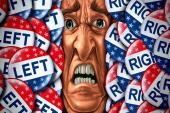CVD Hospitalizations Spiked in Aftermath of 2020 US Election
The bitter Biden-Trump battle seemed to drive up CVD events, particularly acute MI, highlighting the risks of emotional stress.

In the immediate aftermath of the 2020 presidential election—a combative and divisive affair between Donald Trump and Joe Biden—the number of hospitalizations for acute cardiovascular events increased in the United States, according to a new analysis of a large healthcare system.
Compared with a 5-day control period 2 weeks before the election, the risk of hospitalization for acute MI, heart failure (HF), or stroke was significantly higher in the 5 days after the election, a finding that investigators say adds yet more evidence supporting a link between psychological stress and cardiovascular risk.
Jamal Rana, MD, PhD (Kaiser Permanente Northern California, Oakland), who led the study along with Matthew Mefford, PhD (Kaiser Permanente Southern California, Pasadena), said that the deleterious effects of emotional stress on the heart are well known and that the 2020 election was marked by its protracted length and associated tension. While the investigators did not study the mechanisms of stress on the heart, “stress can impact inflammation, the autonomic system, blood pressure, and perhaps even immune response,” Rana told TCTMD.
Although it is easier said than done, we should all try not to take these outside stressors, literally, to heart. Jamal Rana
However negative emotional traits are categorized—whether it’s anger, hostility, mental/psychological stress, or anxiety—the evidence shows it contributes to CVD risk, say researchers. Studies have linked the emotional stress of large-scale national and international events—anything from Hurricane Katrina to the Super Bowl—with adverse clinical outcomes.
In the hours and days after the 2020 election, there were widespread, unproven claims of voter fraud, as well as contention around the different time lines for counting and reporting mail-in and in-person ballots, which led to shifting vote totals. There was also speculation Donald Trump wouldn’t acknowledge losing the election. All this contributed to an “emotional charged atmosphere across the US regardless of demographic or political affiliation,” say Mefford and colleagues. Two years ago, the researchers published a similar study showing a heightened risk of hospitalizations for MI and stroke in the days after the 2016 election, another divisive and bitterly contested battle.
Higher Rate of Acute MI Hospitalizations
Following up on their earlier work, Mefford and colleagues turned to the Kaiser Permanente Southern and Northern California healthcare systems. The analysis, which was published online April 20, 2022, in JAMA Network Open, included 6.4 million adults (53.5% female), of whom 62.1% were aged 18 to 54 years, 29.6% were aged 55 to 74 years, and 8.3% were 75 years and older. Of the participants, 41.3% were White, 32.9% were Hispanic, 16.9% were Asian/Pacific Islander, and 7.9% were Black.
The rate of hospitalization for acute MI, HF, or stroke in the 5 days before and after the 2020 election was 648.0 and 760.5 per 100,000 person-years, respectively (rate ratio 1.17; 95% CI 1.05-1.31). The rate of hospitalization for acute MI was 1.42 higher in the 5 days after the election compared with the 5-day control period prior to the election (204.4 vs 143.5 per 100,000 person-years, respectively), but there was no significant difference in the risk of HF or stroke.
In a subgroup analysis, the rate of hospitalization for CVD was higher among those 75 years and older (P for interaction by age = 0.10), among men (P for interaction by sex = 0.04), and among white individuals (P for interaction by race/ethnicity = 0.51).
Viola Vaccarino, MD, PhD (Emory University School of Medicine, Atlanta, GA), who has studied the effect of stress on heart, said the association between psychological stressors and CVD events is fairly consistent across different studies, outcome measures, and populations. However, she noted, “the strength of the association tends to be higher when examining stress as a trigger of acute CVD events, such as in studies that have used a case-crossover design, and when examining high-risk populations, such as those who already have CVD, like survivors of a myocardial infarction.”
These results do support the notion that vulnerable people may be affected by the stress associated with elections, especially if they have underlying conditions, such as preexisting heart disease, that place them at higher risk. Viola Vaccarino
To TCTMD, Vaccarino cautioned against overinterpreting these latest findings, saying the study is only “suggestive” that the stress of the election increased the risk of acute CVD events. Overall, the effect size is small even though it’s statistically significant, she noted, adding that there were just 112 excess CVD hospitalizations per 100,000 patient-years.
“There is a lot of noise in these types of data, especially because stress was not actually measured, and you can see that from the figures,” she said “The ‘jump’ in rates is small. Even for MI, an increase of 40% is small enough to be possibly explained by confounding factors. And seasonality is what I would be most concerned about, especially because elections occurred very close to the end of the daylight-saving time. It would have been useful to compare results with the same time periods in the previous year, for example.”
Nonetheless, Vaccarino noted that acute stress can trigger myocardial ischemia and this mental stress-induced ischemia is associated with adverse cardiovascular outcomes. Even with the limitations of this latest analysis, “these results do support the notion that vulnerable people may be affected by the stress associated with elections, especially if they have underlying conditions, such as preexisting heart disease, that place them at higher risk,” said Vaccarino.
Awareness of negative emotional traits as a possible risk factor for CVD is a reminder for at-risk people to try to reduce stress and anxiety with various known techniques, said Rana. “This includes exercise, not forgetting to take heart or blood pressure medications, and getting enough sleep,” he said. “Finally, although it is easier said than done, we should all try not to take these outside stressors, literally, to heart.”
Michael O’Riordan is the Managing Editor for TCTMD. He completed his undergraduate degrees at Queen’s University in Kingston, ON, and…
Read Full BioSources
Mefford MT, Rana SJ, Reynolds K, et al. Association of the 2020 US presidential election with hospitalizations for acute cardiovascular outcomes. JAMA Network Open. 2022;5(4):e228031.
Disclosures
- Rana, Mefford, and Vaccarino report no conflicts of interest.





Comments